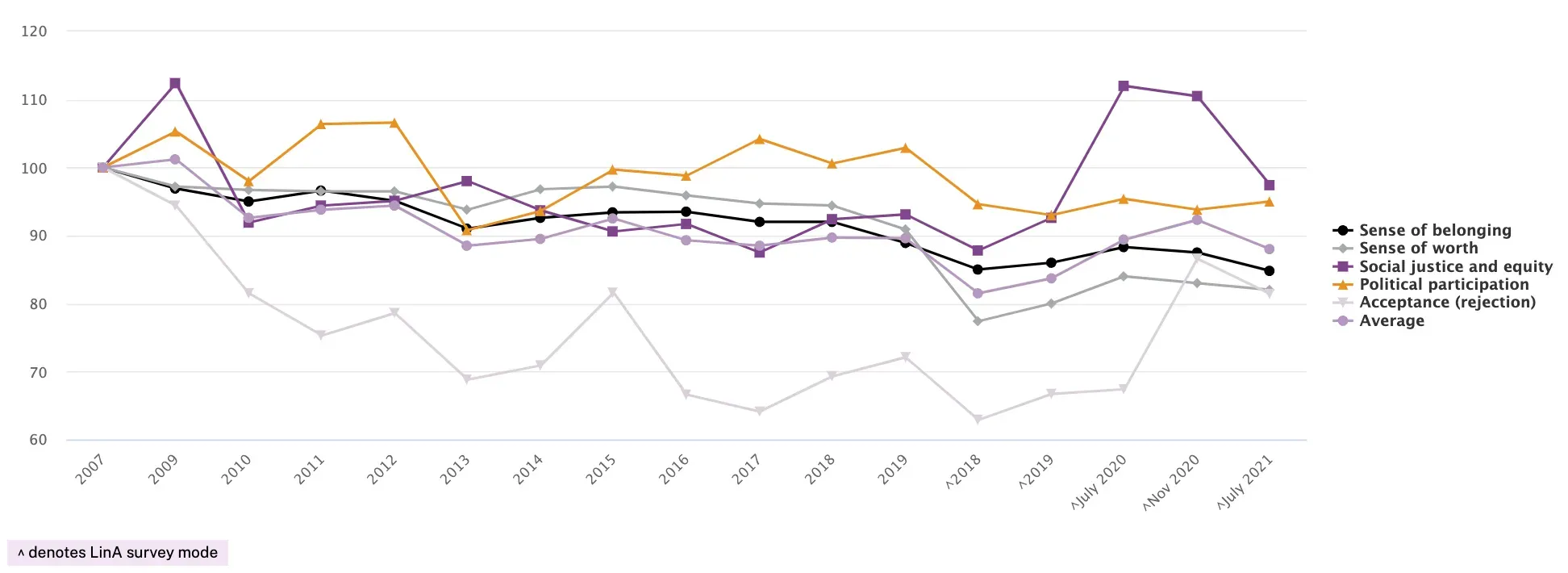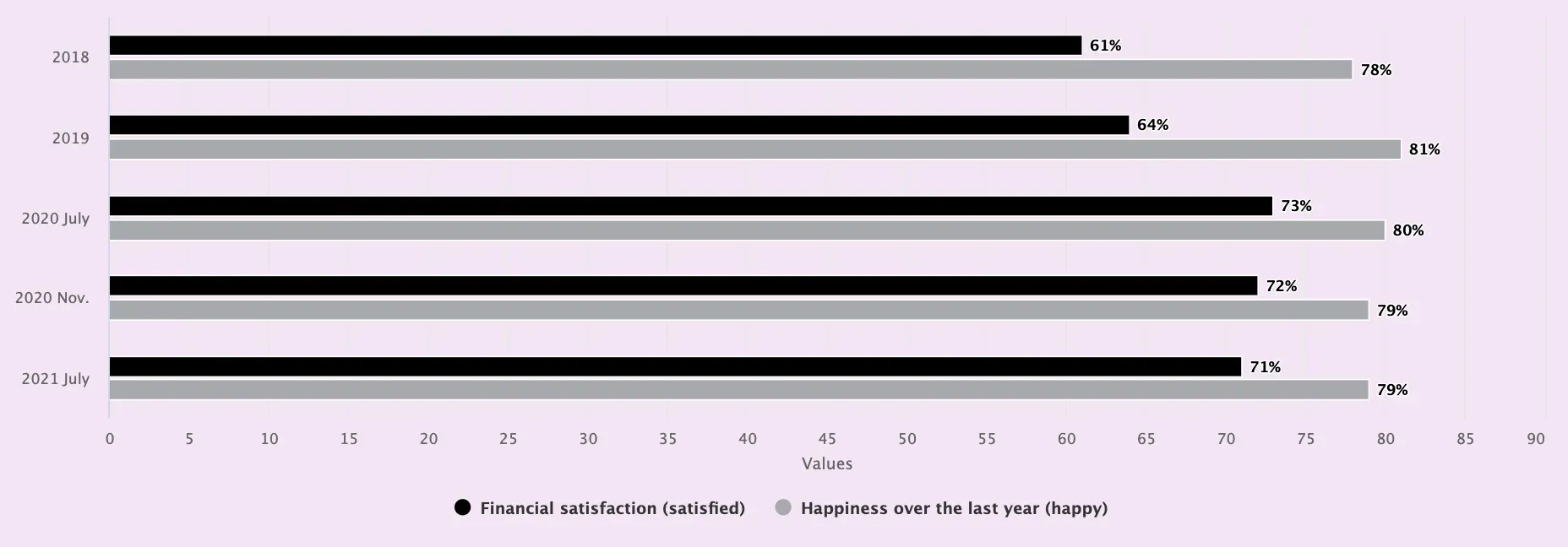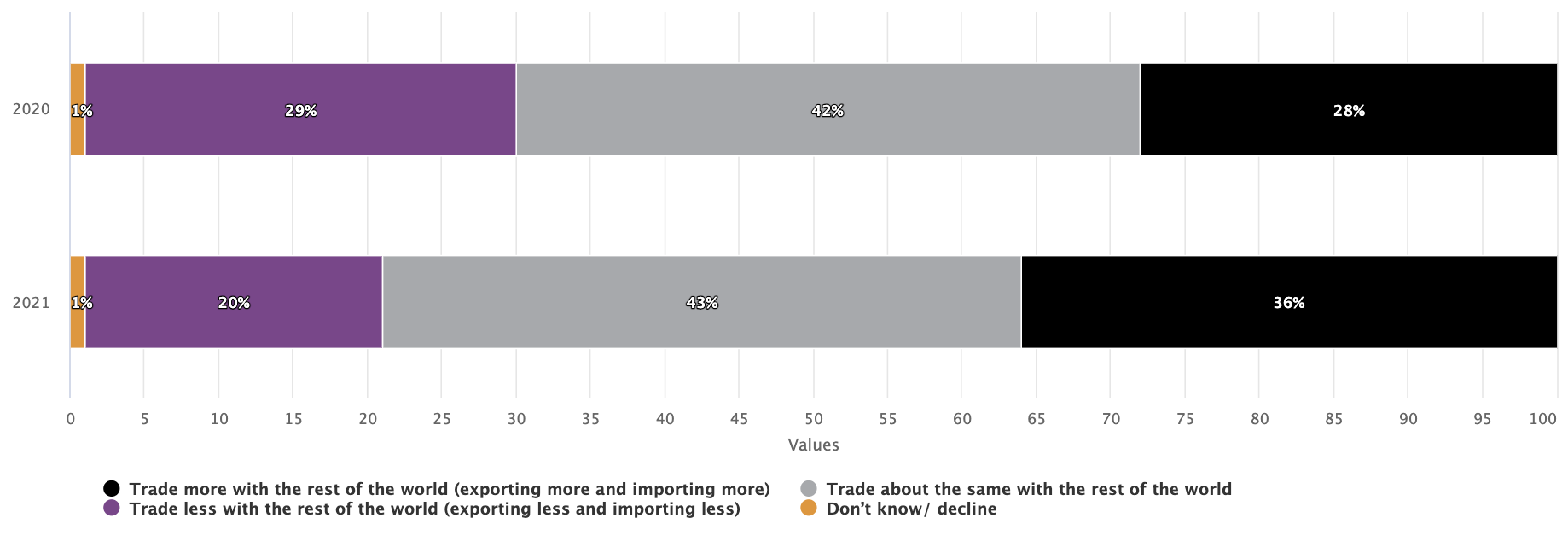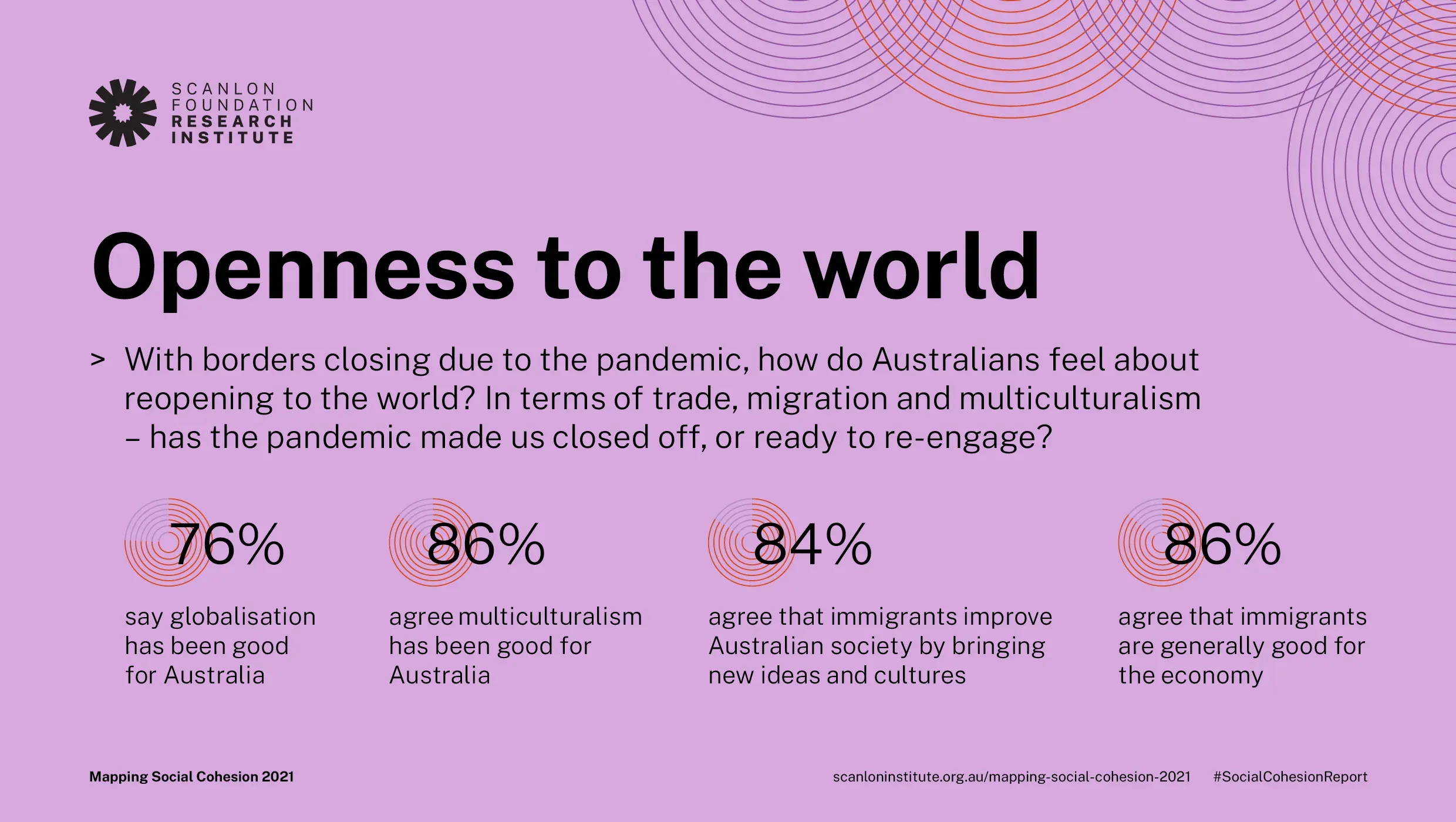Mapping Social Cohesion 2021
> Launching the Australian Cohesion Index
> Incorporating the Scanlon-Monash Index

2021 marks our fifteenth survey, and the third during the pandemic.
This year’s national survey, administered through the Social Research Centre’s probability-based Life in Australia PanelTM, tells us the story of a country making its way through a crisis.
It helps us understand how Australia is responding to the pandemic. What it means for our cohesion. And, what it means for our future.
Our long running surveys tell the story of Australia over time. This year, it tells us even more. It reveals the character of our country as we live through a prolonged crisis.
This year, additional products are added to our research program. The Australian Cohesion Index, developed with funding from the Australian Government Department of Home Affairs, combines attitudinal data from the survey with objective indicators for the Australian Bureau of Statistics and other sources. Combining these data-sets brings more depth and context to the picture of social cohesion in Australia.
Rounding out 2021’s expanded program, we have commissioned a qualitative research project, included as part of the report, to capture in-depth interviews with people from local government areas across Australia with high immigrant and refugee populations, recording the lived experiences of their communities and connection.
Last year’s Mapping Social Cohesion findings indicated that, during the first eight months of the COVID-19 crisis, Australia had experienced increased social cohesion, as people responded to a common threat through mutual support.
Now, almost a year on, and with COVID-19 still very much a part of our lives, has that trend continued, halted, or reversed?
Mapping Social Cohesion 2021
Our fifteenth report on our annual national survey
The new expanded Index on cohesion in Australia
Data and qualitative research on the impact of the pandemic on communities
Chapter 1
The state of cohesion
What do you think is the most important problem facing Australia today?

But what does this mean for the national mood?
With a clear majority focused on one issue, what does it mean for the state of cohesion in Australia?
An answer lies in the Scanlon-Monash Index (SMI), which aggregates responses to 18 questions. It measures attitudes within the five domains with conceptualise social cohesion: belonging, worth, social justice, political participation and acceptance of diversity.

Growing concerns
The major shift in opinion recorded in the 2021 survey relates to the government’s ability to contain the spread of the COVID-19 virus.
Approval of the federal government’s response to the pandemic has fallen from a very high 85% in 2020 to 52%, although still a majority.
How well is the federal government responding to the COVID-19 pandemic?

In your opinion, how well is your state government responding to the COVID-19 pandemic?

State by state
Trust in Government
How often do you think the government in Canberra can be trusted to do the right thing for the Australian people?

Variations by political alignment

Download the 2021 Mapping Social Cohesion Report
Chapter 2
Australia’s mood: of trust and optimism
A number of questions provide insight into the national mood, which was found to be positive over the three surveys conducted in 2020-21. Many Australians say they are optimistic about the country’s future and demonstrate a willingness to trust other people.
It has been argued that trust is the key variable for predicting the level of social cohesion in a society.
Most people can be trusted

Who’s most trusting?
said they were optimistic about Australia’s future, up from 70% in 2020 and 63% in 2019.
said people in their local area are willing to help their neighbours, the same number as 2020 and up from 81% in 2019.
Happiness and Satisfaction
Sense of worth


Download the 2021 Mapping Social Cohesion Report
Chapter 3
Experience (and perception) of discrimination
A substantial number of Australians still face discrimination.
In past Scanlon Foundation surveys, the highest level of discrimination was reported by Australians of non-English speaking background. This worrying finding remains a feature in 2021.
Have you experienced discrimination in the last twelve months because of your skin colour, ethnic origin or religion? Response: ‘yes’

In your opinion, how big a problem is racism in Australia during the COVID-19 pandemic?

Minority opinions
What of minority opinion, has there been a shift during the pandemic? A significant increase in stress and anxiety has been reported by some national surveys.
The Scanlon Foundation survey has not registered this shift, but it has found that minorities with negative outlook comprise 15%-30% of the population, depending on question wording. While the majority indicated that they were optimistic about the future, 29% were ‘pessimistic’ or ‘very pessimistic’. This was, however, a lower proportion than in 2019, when 36% indicated pessimism.

Download the 2021 Mapping Social Cohesion Report
Chapter 4
Openness to the world
Globalisation
Thinking about the growing economic ties between Australia and other countries, sometimes referred to as globalisation, do you think this is very good, fairly good, fairly bad or very bad for Australia?

Australia’s openness to the world was considered in a question first included in the 2018 survey. Respondents are asked if ‘growing economic ties between Australia and other countries, sometimes referred to as globalisation’, is good or bad for the country.
The number of people agreeing globalisation has been good for Australia is 76%, more than three quarters.
Who disagrees?
One Nation supporters
Those whose financial situation is indicated to be ‘struggling to pay bills’ or ‘poor’
Those whose financial situation is ‘just getting along’
Those whose highest level of education is at the trade or apprentice level
In your opinion, should Australia trade more with the rest of the world, trade about the same, or trade less?

Migration
The impact of immigration, selected questions

Multiculturalism has been good for Australia

Values to immigrants are improving
Agree that immigrants improve Australian society by bringing new ideas and cultures
Agree that immigrants are generally good for the economy
Disagree that immigrants take jobs away
Rejection of racist perspectives was also indicated by questions concerning Indigenous Australians.
Strong negative opinions

Download the 2021 Mapping Social Cohesion Report
Chapter 5
How has Australia fared in a time of crisis?
The interviews indicate social cohesion has not been broken by the pandemic. There was no evidence of widespread tensions in communities, of conflict or the ongoing targeting of members of certain cultural communities.
Download the 2021 Mapping Social Cohesion Report
Conclusion
Cohesion perseveres
The 2020 and 2021 Scanlon Foundation surveys have found evidence of a strong, cohesive and resilient society, although not without qualification.
Despite the level of economic dislocation, the surprising finding is that more positive responses have been obtained for a number of questions on personal financial circumstances than in the previous two years.
Unexpectedly, the Scanlon-Monash Index moved in a positive direction, both in July and November 2020, and while it was lower in 2021 at 88, it was still 4.3 index points higher than the pre-pandemic level.
The key to the positive findings appears to be the high (although declining) level of support for government; the high level of trust in fellow citizens; the level of economic satisfaction; and optimism for the future.
Neither the 2020 nor the 2021 survey obtained indication of heightened support for raising barriers and closing Australia to the world. A substantial majority of survey respondents continue to endorse open trade, immigration and multicultural policies. Almost all Australians endorse the general statement that an immigrant is just as likely to make a good citizen as an Australian-born person.
